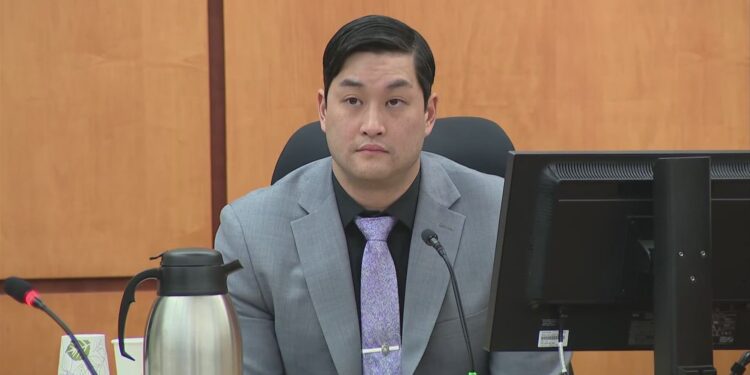The Tacoma City Council approved a $600,000 settlement with former police officer Timothy Rankine and his wife Katherine Chinn, who claimed city officials made false public statements about his role in Manuel Ellis’ death, highlighting complex legal dynamics that can emerge after high-profile police encounters.
Rankine was one of three officers acquitted in December 2023 of criminal charges related to Ellis’ death in police custody on March 3, 2020. Ellis, a Black man, died after being arrested while walking home, with officers accused of punching, tasering, and hog-tying him during the encounter.
The settlement stems from a lawsuit filed in April 2024 alleging that city officials and employees made false statements about Rankine’s involvement in Ellis’ death, causing damage to both his and his wife’s reputations and personal safety. Chinn claimed the city “incited hatred and hostilities” against them, impacting their marriage and creating security concerns.
When video of the Ellis incident was released in June 2020, Tacoma Mayor Victoria Woodards condemned the death and called for the involved officers to be fired and prosecuted. These public statements, made during intense community outrage over Ellis’ death, now form the basis of the officers’ legal claims against the city.
Councilmember Jamika Scott acknowledged the difficult position facing city officials, stating that “sometimes the best choice for us and the fiscally responsible choice for us is not always the choice that feels good for us as council members or you all as community members.” Her comments reflect the challenging balance between fiscal responsibility and community expectations.
The settlement represents a significant reduction from the original claims, with Rankine initially seeking $35 million and Chinn requesting $12 million in damages. The negotiated amount suggests both parties recognized the legal risks of proceeding to trial while accepting a substantial payout for the alleged harm.
All three officers involved in Ellis’ death voluntarily resigned from the Tacoma Police Department after their acquittal. An internal affairs investigation found they didn’t violate the department’s use of force policy, allowing them to leave “in good standing” despite the public controversy surrounding the case.
The case illustrates the complex legal landscape that can emerge when public officials respond to controversial police incidents. While community pressure often demands immediate condemnation of apparent misconduct, such statements can later become the basis for defamation claims if criminal prosecutions fail to result in convictions.
For Tacoma residents, the settlement raises questions about how city officials should respond to controversial police incidents while protecting both community interests and potential legal exposure. The substantial payout comes from taxpayer funds that could otherwise support city services or community programs.
Rankine and Chinn have also filed a separate tort claim against the Washington State Attorney General’s Office, which remains under review. This additional legal action suggests the officers believe state officials also made damaging statements about their conduct during the prosecution process.
The Manuel Ellis case has had lasting impacts on Tacoma’s police department and community relations, with his death becoming a focal point for discussions about police reform and accountability. The settlement with Rankine and Chinn adds another layer to the ongoing legal and financial consequences stemming from the 2020 incident.
For other Washington cities, the Tacoma settlement may influence how officials respond to future controversial police incidents, potentially creating more cautious approaches to public statements during ongoing investigations to avoid similar legal exposure.







